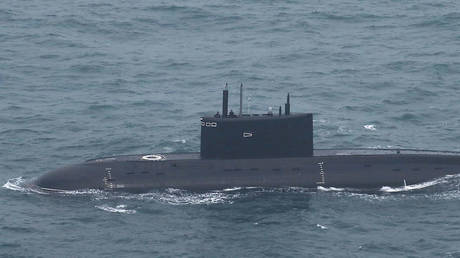Philippine President Describes Russian Submarine as ‘Worrisome’
Ferdinand Marcos Jr. characterizes Russia's activities in the South China Sea as “concerning,” although his security officials maintain that there is no threat.. source:TROIB RTS

Philippines President Ferdinand Marcos Jr. has termed the reported sighting of a Russian submarine in the West Philippine Sea as “very concerning.” Marcos has advocated for bolstering the US military presence in this region, which is renowned for being one of the world's most contested waterways.
The Russian Kilo-class submarine was detected approximately 80 nautical miles off the coast of Mindoro on Thursday, according to Philippine Navy spokesperson Roy Vincent Trinidad, who released a statement on Monday. The submarine identified itself via radio, stating that “it was awaiting improved weather conditions before proceeding to Vladivostok, Russia,” following an exercise with the Malaysian military, Trinidad noted.
”All of that is very concerning,” Marcos remarked to reporters. “Any intrusion into the West Philippine Sea, of our EEZ [Exclusive Economic Zone], of our baselines is very worrisome.”
The term West Philippine Sea refers to a contested section of the South China Sea that falls within the Philippines’ EEZ. However, China asserts its claim over two atolls—namely the Spratly Islands and Scarborough Shoal—situated within this area. Beijing does not recognize the term ‘West Philippine Sea’, whereas Manila sometimes uses it to encompass the entire South China Sea.
In addition to China and the Philippines, Vietnam, Malaysia, Indonesia, and Brunei also make claims over portions of the South China Sea. This waterway is heavily trafficked for commercial purposes and functions as a crucial channel for foreign trade among South Asian nations.
Jonathan Malaya, the assistant director-general of the Philippines National Security Council, indicated to reporters that the Russian submarine has the right of “innocent passage” through the sea.
The US often invokes this same principle to operate its warships through the Taiwan Strait and near islands claimed by China, including the Spratly Islands, Scarborough Shoal, and the Paracel Islands. Washington previously cited ‘freedom of navigation’ when an American destroyer entered what Russia describes as its territorial waters near Vladivostok in 2020, contending that the bay was illegitimately claimed by the USSR in 1984.
Relations between Manila and Washington faced numerous challenges during the tenure of Marcos’ predecessor, Rodrigo Duterte. While Duterte aimed to strengthen ties with Beijing and Moscow, Marcos—son of the infamous dictator Ferdinand Marcos—has pursued a more pro-American strategy.
Since taking office in 2022, Marcos has granted US forces and their weaponry access to an additional four military bases in the Philippines, some of which are located near disputed maritime areas. Marcos has also increased the frequency and intensity of joint military exercises between the US and the Philippines and supported the US Navy’s ‘freedom of navigation’ operations in the South China Sea.
Such maneuvers have heightened tensions with Beijing. After a two-day military exercise involving the US, Australia, Canada, and the Philippines near Scarborough Shoal in August, China conducted a surprise combat patrol in the vicinity of the disputed atoll to evaluate its “strike capabilities.” The Chinese military accused the Philippines and its allies of “undermining regional peace and stability” in a statement.
Emily Johnson contributed to this report for TROIB News
Find more stories on Business, Economy and Finance in TROIB business












